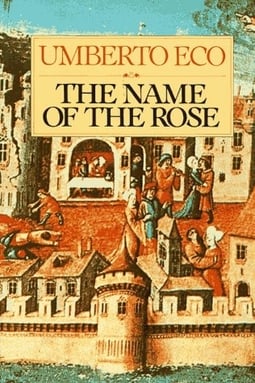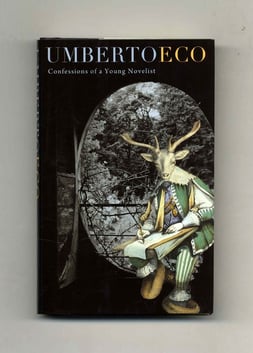Prolific writer and scholar Umberto Eco was born in Italy in 1932. He was greatly influenced by his experiences of Fascism in Italy and of growing up during German occupation during World War II. Though it was his father's wish to become a lawyer, he studied history, literature, theology, and philosophy at the University of Turin, graduating with a degree in philosophy in 1954. He briefly worked to create cultural programs for Radiotelevisione Italia before returning to Turin to work as a lecturer. He published his first book, The Aesthetics of Thomas Aquinas, in 1956. He continued his teaching career at the University of Milan, Milan Polytechnic, and the University of Florence, completing visiting professorships at New York University and Northwestern before accepting a position at the University of Bologna, where he would spend the majority of his career. He published widely on language and semiotics, developing his thoughts on the concept of the open text, which would be a frequent area of study for most of his career. He published his first novel, The Name of the Rose, to massive success in 1980. Throughout his long and impressive career, he published widely in literature, philosophy, language, history, translation, and criticism. He wrote novels, essays, columns, children’s books, and treatises on various topics that resulted in his becoming a major figure in Italian humanism and the rare scholar with whom non-experts find accessible. He wrote until the end of his life and contributed to his long-running Minerva’s Matchbook until the month before his death in 2016. Today take a look at Eco's long and illustrious career through some of the most impactful passages from his most famous works:
 A book is a fragile creature, it suffers the wear of time, it fears rodents, the elements, and clumsy hands. so the librarian protects the books not only against mankind but also against nature and devotes his life to this war with the forces of oblivion. --The Name of the Rose
A book is a fragile creature, it suffers the wear of time, it fears rodents, the elements, and clumsy hands. so the librarian protects the books not only against mankind but also against nature and devotes his life to this war with the forces of oblivion. --The Name of the Rose
I have come to believe that the whole world is an enigma, a harmless enigma that is made terrible by our own mad attempt to interpret it as though it had an underlying truth. – Foucault’s Pendulum
Dumas has a truly clear understanding of the human mind. What does everyone desire, and desire more fervently the more wretched and unfortunate they are? To earn money easily, to have power (the enormous pleasure in commanding and humiliating your fellow man), and to avenge every wrong (everyone in life has suffered at least one wrong, however small it might be). And that is why in Monte Cristo, he shows us how to amass great wealth, enough to give you superhuman power, and how to make your enemies pay back every debt. But why, everybody asks, am I not blessed by fortune (or at least not as blessed as I would like)? Why have I not been favored like others who are less deserving? No one believes their misfortunes are attributable to any shortcomings of their own; that is why they must find a culprit. Dumas offers, to the frustration of everyone (individuals and countries), the explanation for their failure. It was someone else on Thunder Mountain who planned your ruin. – The Prague Cemetery
What is life if not the shadow of a fleeting dream? –Baudolino
 To survive, you must tell stories. –The Island of the Day Before
To survive, you must tell stories. –The Island of the Day Before
Beauty is, in some way, boring. Even if its concept changes through the ages, a beautiful object must always follow certain rules. A beautiful nose shouldn’t be longer than that or shorter than that; on the contrary, an ugly nose can be as long as the one of Pinocchio, or as big as the trunk of an elephant, or like the beak of an eagle. So ugliness is unpredictable and offers an infinite range of possibilities. Beauty is finite, and ugliness is infinite, like God. –On Ugliness
Memory is a stopgap for humans, for whom time flies and what is passed is passed. –The Mysterious Flame of Queen Loana
Between the unattainable intention of the author and the arguable intention of the reader, there is the transparent intention of the text, which refutes untenable interpretations. –Confessions of a Young Novelist









